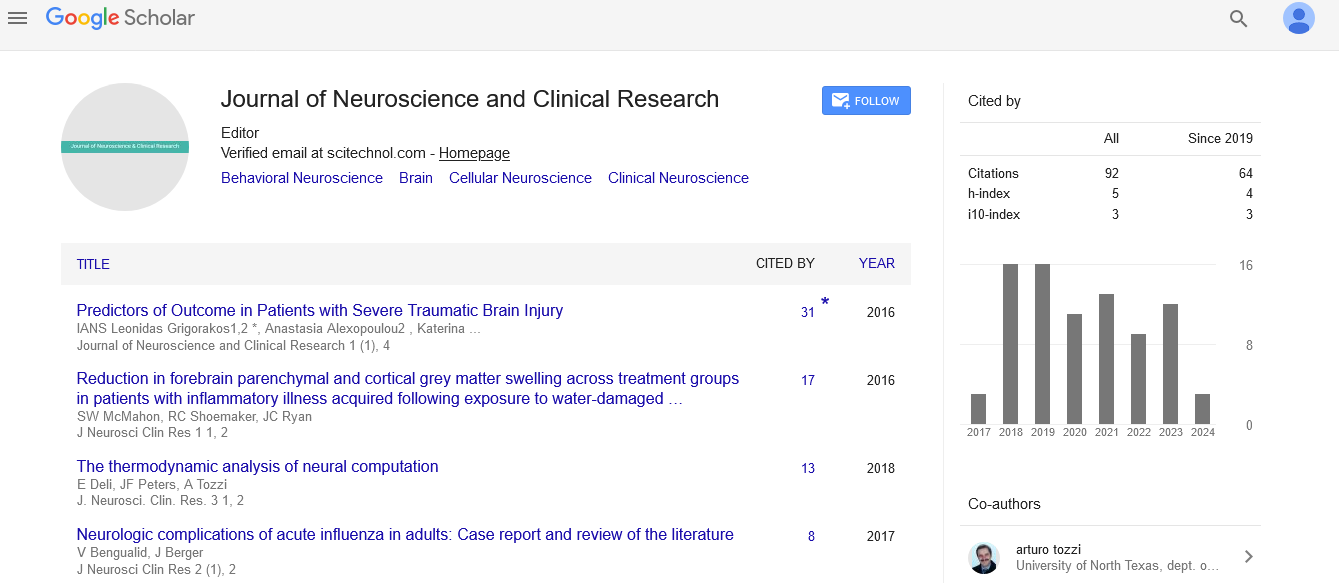Commentary, J Neurosci Clin Res Vol: 8 Issue: 2
Brain Function and Mental Health: Insights into the Neuroscience of Psychological Disorders
Richard J. McNally*
Department of Psychology, Harvard University, Cambridge, United States of America
*Corresponding Author: Richard J. McNally
Department of Psychology, Harvard
University, Cambridge, United States of America
E-mail: mcnallyr@gmail.com
Received date: 29 May, 2023, Manuscript No. JNSCR-23-106767;
Editor assigned date: 31 May, 2023, PreQC No. JNSCR-23-106767 (PQ);
Reviewed date: 14 June, 2023, QC No. JNSCR-23-106767;
Revised date: 21 June, 2023, Manuscript No. JNSCR-23-106767 (R);
Published date: 28 June, 2023, DOI: 10.4172/Jnscr.1000159
Citation: McNally RJ (2023) Brain Function and Mental Health: Insights into the Neuroscience of Psychological Disorders. J Neurosci Clin Res 8:2.
Description
The complex relationship between brain function and mental health has long intrigued experts and medical professionals. Advances in neuroscience have provided valuable insights into the biological underpinnings of psychological disorders, shedding light on how brain function impacts mental well-being. By understanding these insights, one can gain a deeper appreciation of the challenges individuals face and work towards more effective interventions and treatments.
The neural basis of psychological disorders
Psychological disorders, such as depression, anxiety, schizophrenia, and bipolar disorder, have complex origins that involve both genetic and environmental factors. Neuroimaging studies have revealed structural and functional abnormalities in specific brain regions associated with these disorders. For instance, alterations in the prefrontal cortex, amygdala, and hippocampus have been observed in depression and anxiety. Understanding these neural changes can provide important clues about the underlying mechanisms and potential targets for intervention.
Neurotransmitters and mental health
Neurotransmitters, the chemical messengers in the brain, play an important role in regulating mood, emotions, and cognition. Imbalances in neurotransmitter systems, such as serotonin, dopamine, and Gamma-Aminobutyric Acid (GABA), have been implicated in various psychological disorders. For example, low serotonin levels are associated with depression, while abnormalities in dopamine signalling contribute to conditions like schizophrenia. Medications targeting these neurotransmitter systems aim to restore balance and alleviate symptoms.
Stress, the Hypothalamic-Pituitary-Adrenal (HPA) axis, and mental health
The stress response involves the Hypothalamic-Pituitary-Adrenal (HPA) axis, a complex interaction between the brain and the endocrine system. Chronic stress can dysregulate the HPA axis, leading to increased production of stress hormones like cortisol. Prolonged exposure to high levels of stress hormones can have detrimental effects on brain structures and function, contributing to the development and exacerbation of mental health disorders. Understanding this connection highlights the importance of stress management and resilience-building strategies.
Epigenetics and gene-environment interaction
Epigenetic mechanisms regulate gene expression without altering the underlying DNA sequence. Emerging studies suggest that epigenetic modifications can be influenced by environmental factors such as early-life experiences, trauma, and chronic stress. These modifications can shape brain function and increase vulnerability to mental health disorders. Studying gene-environment interactions and epigenetic processes provides valuable insights into the mechanisms by which environmental factors impact mental well-being.
Neuroplasticity and recovery
Neuroplasticity refers to the brain's ability to adapt and reorganise itself in response to experience and environmental changes. This remarkable property has important implications for mental health and recovery. Therapeutic interventions, such as cognitive-behavioural therapy and mindfulness practises, can harness neuroplasticity to promote positive changes in brain function and alleviate symptoms. Understanding the mechanisms underlying neuroplasticity enables the development of targeted interventions to support mental health recovery.
Conclusion
The intricate relationship between brain function and mental health continues to be a topic of intense study and exploration. Insights from neuroscience shed light on the neural basis of psychological disorders, emphasising the importance of a holistic approach to mental well-being. By understanding the neurobiological mechanisms involved, one can develop more effective treatments and interventions. Furthermore, recognising the role of neurotransmitters, stress, epigenetics, and neuroplasticity offers hope for personalised approaches to supporting individuals with psychological disorders. With ongoing studies and collaboration between neuroscience and mental health disciplines, one can enhance our understanding and foster improved outcomes for those affected by mental health challenges.
 Spanish
Spanish  Chinese
Chinese  Russian
Russian  German
German  French
French  Japanese
Japanese  Portuguese
Portuguese  Hindi
Hindi 